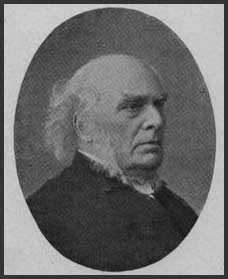The Prince of Scottish Hymnists
 Among the Presbyterian hymn writers of the Church, none stand higher than that of Horatius Bonar. Born on this day December 19, in 1808, Horatius Bonar came from two centuries of ministers, a total ministerial ancestry of 364 years of ministry. When Horatius was just twelve years old, death took his father, James Bonar. His saintly mother, Marjory, and his elder brother James, took over his spiritual upbringing. Attending Edinburgh University, the beneficial influence of Dr. Thomas Chalmers added to that training.
Among the Presbyterian hymn writers of the Church, none stand higher than that of Horatius Bonar. Born on this day December 19, in 1808, Horatius Bonar came from two centuries of ministers, a total ministerial ancestry of 364 years of ministry. When Horatius was just twelve years old, death took his father, James Bonar. His saintly mother, Marjory, and his elder brother James, took over his spiritual upbringing. Attending Edinburgh University, the beneficial influence of Dr. Thomas Chalmers added to that training.
Horatius Bonar entered the ministry of the Church of Scotland, being ordained in 1837. His first charge was that of mission work in Leith at St. John’s parish, and then at Kelso, Scotland. In 1843, he married Jane Catherine Lundie, with five of their nine children dying in succession. Taking his stand with the Bible-believers in the church, he joined the Free Church of Scotland and then began to display his gift of hymn writing. Moving to Edinburgh, he ministered in a church named after his former professor, Chalmers Memorial Church. He was honored by his colleagues by being elected as Moderator of the Free Church of Scotland in 1883. He died on May 31, 1889.
Such are the facts of his life. What is more interesting to our readers may be to think upon many of his hymns which have blessed the church world ever since. Those who come to this site with their worship rooted in the Blue or Red Trinity hymnal will find 19 hymns in the blue Trinity and 14 hymns in the red Trinity hymnal. We are blessed by them all.
It is clear that his hymns included the state of the sinner outside of Christ. “I was a wandering sheep,” he wrote in hymn number 464. “I would not be controlled,” he added. Does not that describe our condition before Christ found us? “I was a wayward child, I once preferred to roam,” was our sad testimony.
Then came the wonderful words of life. “I heard the voice of Jesus say, ‘Come unto me and rest.'” And then our testimony, “I came to Jesus as I was, weary and worn and sad; I found in Him a resting place, and he has made me glad.” No. 304. Is this your testimony?
In his life, Bonar was a soul-winner, with a special interest in the salvation of the Jews. He was sent to Palestine in 1839 to visit the principle points of their existence. He visited again in 1856. It is interesting to this author that his eschatology was pre-millennial, with God’s future for Israel upon his heart.
He certainly lived the words of “Go, Labor on” on page 584. Verse 5 should describe you and me when it says, “Toil on, faint not, keep watch and pray; be wide the erring soul to win; go forth into the world’s highway, compel the wand’rer to come in.”
Words to Live By:
There may be great spiritual profit to gather a few Christian friends together around a piano, or at a Sunday evening service, to sing the hymns of Horatius Bonar. Let the pastor and/or song leader do more study on his life. After each song is sung, discuss what doctrines or duties are found in the words. Share how his words speak to your heart and are seen in your actions.

Good artice but wrong picture 🙂 That is Andrew Bonar in the photograph.
Doh! Mea culpa. (Latin for “My bad.”)